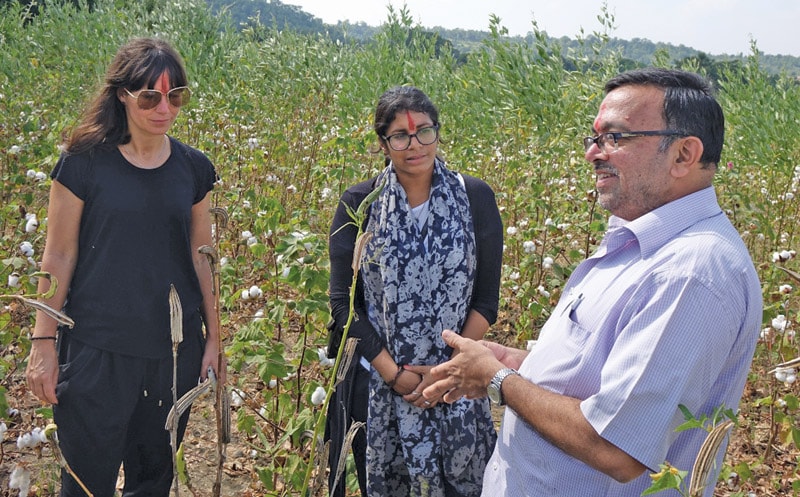
Struggling with the difficult market conditions, Indian exporters, brands and buyers across the world are equally under pressure, yet some of them are committed to supporting sustainable initiatives. And it is heartening to see that they are contributing to Indian organizations and that too from the ground-level, right from the cotton stage. Chetna, an initiative to support organic cotton and promoting social, environment and economic sustainability to enhance livelihoods of small landholder rural households from ecologically depressed regions, is continuously growing. Apparel Online, explores the support being provided by brands/buyers and other overseas organizations to Chetna in its endeavour.
The Chetna Coalition (ChetCo) is a shared-value sourcing coalition of brands and facilities for the sustainability of Chetna’s Organic & Fair Trade (OFT) cotton farming communities, which is being supported by almost 15 global brands and 5 facilities. It includes Boll & Branch (US-based home furnishing e-retailer,) prAna (a lifestyle brand of US), Dibella (Germany-based company offering textile goods in restaurant, hospitality and healthcare sectors), Cuyochi (home and apparel retailer, US), Loomstate (casual clothing retailer, US), PACT (NGO), etc. These organizations support Chetna in terms of working capital pre-finance for purchasing the OFT cotton required for manufacturing their garments/home furnishing products. Support is monetary, technical fronts, sometime in the shape of very good guidance and for the improvement of education, and water facilities in the areas of farmers. Support primarily goes to smallholder Chetna OFT cotton farmer communities (pre-dominantly tribal) in 6 rain-fed blocks of Adilabad district in (Telangana) and 7 rain-fed blocks in 3 districts in South Odisha.
PACT, prAna and Boll & Branch has contributed interest-free working capital advance of US $ 100,000 to US $ 200,000 for Chetna to purchase cotton from its member farmers without it leaking into open markets. Yumeko (eco bed and bath brand based of Netherlands) has also provided Chetna with an interest-free working capital advance of Euro 300,000 through their associated foundation (Dito Foundation) aimed at helping Chetna farmers in benefiting from the marketing opportunities. Furthermore, Yumeko has expressed its wish to make a social premium support during its perspective field visit in future.
Rabo Bank Foundation will continue to provide a collateral guarantee of Rs. 2.50 crore, same as last year. Friends of the Women’s World Bank (FWWB), has agreed to offer a loan of Rs. 50 lakh at an interest rate which is under negotiation. Loans with Yes Bank and Maanveeya are running on a credit line policy until the next 3 years. Prolana supported it with Rs. 2.65 lakh for setting up a mini gin unit for organic cotton seed extraction. Coyuchi offered to support organic cotton ‘seed’ cost for one cooperative in Chetna, while Loomstate provided a person to coordinate with ChetCo and paid for his time.
Rajlakshmi Cotton Mills, Kolkata; Armstrong Spinning Mills, Coimbatore and Mandala Apparels, Puducherry, Super Spinning Mills, Coimbatore and GTN Group, Cochin are the manufacturers/ exporters associated with Chetna.
This kind of support helped Chetna (as a smallholder owned producer company) to avail loans from Yes Bank, NABARD and Maanveeya / Oiko Credit (Micro Finance Organization) to the tune of nearly Rs. 6 crore with continued collateral guarantee from Rabo Bank Foundation (NL) for fiscal 2015-16 and the loans have been repaid on time.
Individually, PACT has also contributed US $ 2,500 to US $ 25,000 to support certification costs and help build Labs in a tribal girl’s boarding school, while Dibella and Scorrett (Sweden) has contributed for Chetna’s safe water projects. Moreover, Dibella has created a ‘cotton fund’ for consumers staying in hotels that use OFT laundry (bed sheets, pillow covers, etc) who contribute a little amount that goes back to cotton farmers of Chetna. Also, Nudie Jeans has contributed Euro 2,000 for computer support to girl’s tribal school where children of cotton farmers study. Felssimo contributed Rs. 2.50 crore over the last 5 years for education projects (scholarships and enterprise development for women and adolescent girls), transition support and infrastructure development projects confined under Peace-By-Peace Cotton Programme where consumers contribute to a fund on purchase of each garment. It also imports T-shirts for tribal children to paint and undertake embroidery work. The premiums are then passed to the women/girls under the ‘Stitch By Stitch’ project. Likewise, Inditex has contributed US $ 75,000 over last three years for women seed Banks. C&A has provided 3D panel costs.
Simultaneously, it is being supported for its own working and to improve systems like Pi Foundation, and Chetna’s senior staff with funding from C&A Foundation conducted in-depth baseline analysis on social, environmental, and economic/financial data from two villages within Chetna organic – a 3DPnL (3 Dimensional Profit Not Loss Accounting). ChetCo brand members have used the findings of the 3DPnL to enhance brand value of Chetna’s newly implemented MIS. It is interesting to see that demands from associated brands in ChetCo, garment facilities and global supplying companies Dibella and others associated with Chetna from outside ( Felissimo/Toyoshima, Japan) are growing manifold and therefore they will still need to seek OFT cotton from other ‘non-traceable’ suppliers as the in-conversion cotton at Chetna will only be converted to OFT by 2018.






